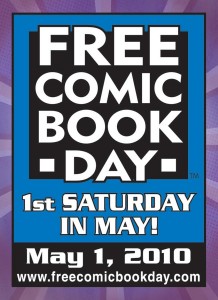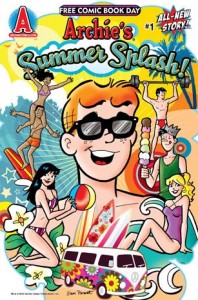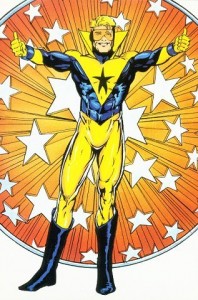Free Comic Book Day 2010
 As comic book fans across North America know, last Saturday was the annual Free Comic Book Day.
As comic book fans across North America know, last Saturday was the annual Free Comic Book Day.
FCBD is an ingenious promotion that publishers and stores across the continent have developed to encourage new readers to try out comics and graphic novels.
It’s a simple concept: on the first Saturday in May most major comic book publishers release free copies of comics which the stores hand out to any and all customers. The idea is to get new patrons into the stores and to introduce older fans to new titles or creators.
Although I’m a big-time comic book nerd, this was my first experience with FCBD. I went to Paradise Comics, my Local Comic Store, and dragged my girlfriend Katy along.
Between the two of us we picked up six comics:
Boom! Studios – Irredeemable/Incorruptible double-sided: This was actually the last comic I picked from the spread. It just so happened that the Incorruptible cover was the one facing up on the table, and that’s what drew me in. Of course, Mark Waid’s story is great and as these are reprints of both series’ first issues, this was a perfect jump-on for new readers.
I’d read Irredeemable before, and think its concept of superhero-turned-ultimate-villain is fine. Certainly, Waid does an excellent job of building a sense of dread and terror as Superman-analog the Plutonian rampages around the world.
The only problem is that it’s been done before. Watchmen, the Dark Knight Returns, Rising Stars and the Squadron Supreme, amongst others, have broached these themes before. It’s not that Waid does it better or worse than these other titles, it’s just well-tred territory.
Incorruptible, however, is brilliant. It chronicles the reaction of supervillain Max Damage to the Plutonian’s berserker rage and his decision to prepare to fight the hero. I am hooked. I want more, and that’s what Free Comic Book Day is all about.
IDW – G.I. Joe #155 ½: I’m definitely a fan of G.I. Joe but this comic did nothing for me. The Joes themselves are only mentioned in one panel of the comic. Although there’s a great deal of action, the plot relies heavily on past storylines from earlier G.I. Joe comics.
I can see that some people might be intrigued by Cobra Commander’s scheme to take over the United States, but it seems like a very continuity-heavy book that could turn off new fans drawn in by the recent live-action movie.
Maerkle Press – Love and Capes #13: I’d heard good things about this comic from the Invincible Super-Blog and an interview with creator Thom Zahler on an episode of the War Rocket Ajax podcast.
As usual, Chris Sims and Eugene Ahn didn’t lead me astray. It was a fun, light-hearted read about the newly-married Crusader and his wife Abby as they adjust to their new life together.
The humorous vignettes of what it’d be like to be a married superhero were good for some laughs and Zahler’s artwork is clean and expressive.
 Archie Comics - Archie’s Summer Splash #1: Written and illustrated by Dan Parent, this comic is exactly what you’d expect from the good folks at Archie. It’s a fun, one-and-done book centred around a minor social conflict between average American teenagers.
Archie Comics - Archie’s Summer Splash #1: Written and illustrated by Dan Parent, this comic is exactly what you’d expect from the good folks at Archie. It’s a fun, one-and-done book centred around a minor social conflict between average American teenagers.
I appreciate that Archie Comics put out a brand new story for FCBD and one that can be easily understood by any new reader. I’m just sorry that it doesn’t really focus on the main four Riverdalians (Archie, Jughead, Betty and Veronica). Sure, they’re there, but they could have been anyone.
That said, that’s my only complaint. Parent strikes again, doing a solid job of writing and illustrating this story.
Marvel Comics - Iron Man/Nova: Along with the Incorruptible half of Boom’s efforts, this was the best comic I read on Saturday.
Specifically labelled as “Great for all ages”, this book is fun and easy for any fan to understand. Craig Rousseau’s artwork is very detailed while remaining light and easy on the eyes. Writer Paul Tobin squeezes a lot of exposition into the dialogue between Nova, Iron Man and Kate McMillan but manages to keep the plot moving.
I like the choice of heroes as well. Obviously, Iron Man’s inclusion serves as a tie-in to Iron Man 2 which comes out in just one week. Nova is an odder choice as he’s got a lower profile than most characters, but since he is going to be a member of the new Secret Avengers book coming out this month his inclusion also makes sense. Nova is also more accessible for younger readers, since he’s a college student, an everyman in the vein of Spider-Man.
Also, it features monkeys and apes. Who doesn’t love simians?
Marvel Comics - Iron Man/Thor: Inversely, this is the worst comic I picked up on Saturday.
In theory, it should’ve been great. As mentioned above, Iron Man has starred in a wildly popular movie with another one coming out in a few days. Thor’s movie is in production and is a cornerstone of the Marvel Universe. There’s a lot of buzz surrounding the characters.
Matt Fraction is one of the hottest scribes in the industry right now, writing the monthly Iron Man and Thor titles. Penciler John Romita Jr. is one of the best comic book artists ever, and a mainstay of Marvel comics. Again, you’d think a creative team like that would be a slam dunk.
Unfortunately, this story is confusing as all hell. Both characters are kind of jerks, not just to the villains but to each other as well. It’s hard to place when in continuity this happens and it ends on a puzzling note with Thor flying over a wrecked supertanker in the green fields surrounding Ayer’s Rock in Australia and Iron Man standing on the moon before a bunch of wreckage that includes a sign for Stark technology.
Not the kind of gateway to two monthly titles that Marvel was probably hoping for and a disappointment to fans familiar with the characters or creators of this issue.
An ode to Booster Gold
It’s funny how everyone has a guilty pleasure - a band, movie or book that we love but was hardly a critical or commercial success. Comic book fans are no different. They always have at least a couple of characters that they hold dear to their heart.
I know that I’ve got a few. There’s one name that’s always at top of mind for me though: Booster Gold.
Never heard of him? That’s cool, most people haven’t. Indeed, it’s a running joke on an episode of Justice League Unlimited that everyone thinks that he’s Green Lantern and they’re disappointed when they find out that it’s Booster Gold.
Booster Gold is Michael Jon Carter, a collegiate football star from the far-flung future of the 25th century. He started placing bets on his own games and then threw them for profit. Disgraced, he became a night watchman at a museum that housed artefacts from the so-called Age of Heroes – our modern heroes like Superman and Batman.
With the help of a floating security robot named Skeets, Booster stole equipment and weapons from the displays, and used Rip Hunter’s time machine to travel to the 20th century. When he arrived in the 1980s he used his limited knowledge of historical events to position himself in the right place at the right time and become a superhero brand that would save lives as well as turn a healthy profit.
With Skeets acting as a roving encyclopedia, Booster blunders from heroic episode to heroic episode, often doing more harm than good while trying to create a public image that he can gain from financially. Recently (and somewhat improbably) he's become the guardian of the time stream, trying to maintain order and balance in the universe.
There are two things that appeal to me about Booster: his origin and how well he reflects the zeitgeist of the 1980s.
I think that the best fictional characters, superheroes and otherwise, have origins that explain their motivation for the rest of their existence. Sticking to comic books, some Batman, Spider-Man and the Punisher are popular because they are driven by a combination of guilt and anger over the death of their beloved family members.
All three of those creation stories make sense. To an extent, the reader can understand why these guys are dressing in spandex and putting their lives in danger. Their behaviour is clearly motivated by the tragedy in their origins.
Booster Gold’s driving force is simple: he’s greedy. He covers his uniform with corporate logos, puts money on the stock exchange before big bumps and is generally a glory hog. Or that time he married a sexagenarian for her money. It's not an altruistic reason for becoming a superhero, but it has an inherent logic. You can get what he’s about.
Just as Captain America was ideally suited to the surge of patriotism in the lead up to World War 2 or Marvel heroes like Iron Man and Nick Fury fit the Cold War era, Booster Gold’s 1986 debut was perfectly timed. He was just right for the greed is good, egotistical 80s. He developed as a character into the 1990s, just as corporate monopolies disguised as “synergy” and mass sponsorship became the norm in North America.
Booster Gold is often under-utilized but instantly appealing to anyone who grew up in the 1980s. He’s greedy, funny, a little bit cynical and surprisingly heroic. More than just about any other big name comic book character he fits into our contemporary worldview and, most importantly, he’s believable. The reader can understand why he does the things he does. He’s as real as a man from the future can be, and although he’s a guilty pleasure of mine, I rarely regret it.
